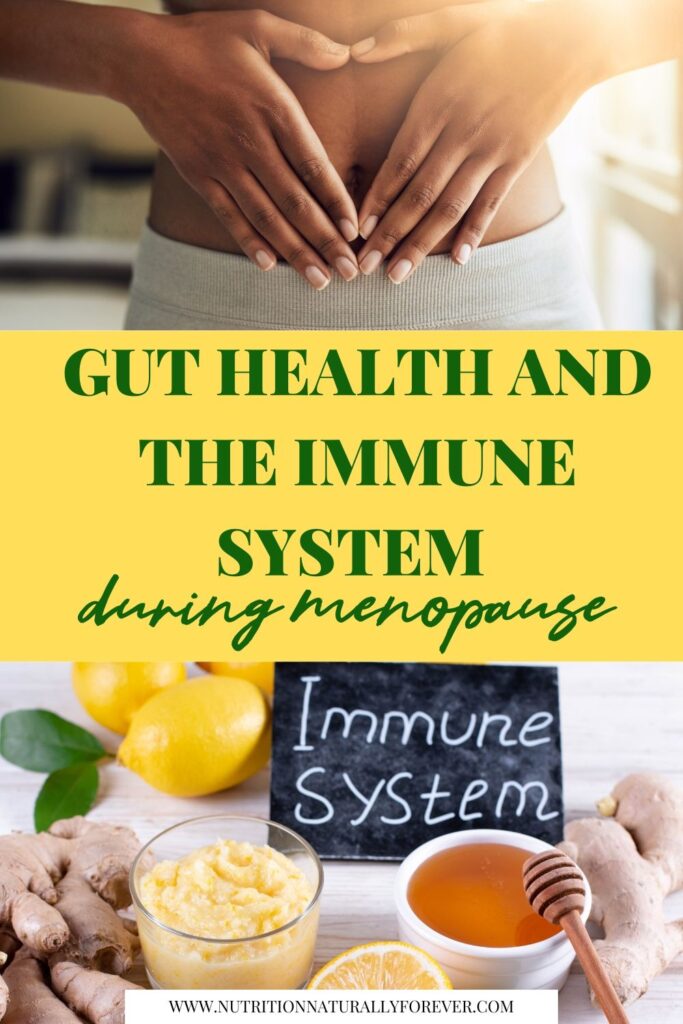
Gut Health and the immune system during menopause.
At the epicentre of our digestive system lies a bustling metropolis of microorganisms collectively known as the gut microbiota.
Comprising trillions of bacteria, fungi, and other microbes, this diverse community plays a pivotal role in maintaining our digestive health and overall well-being.
Picture this gut bacteria community as a thriving ecosystem within us, where each microbe fulfils a unique role in maintaining harmony and balance, from aiding in nutrient absorption to bolstering our immune defences. The gut microbiota is a dynamic force that impacts virtually every aspect of our health.
Parallel to this bustling microbial community is our body’s formidable defence system, the immune system.
Tasked with safeguarding us against pathogens and maintaining tissue integrity, the immune system is the guardian of our well-being.
During menopause, this intricate defence network undergoes significant changes, influenced by fluctuating hormone levels and the natural ageing processes of the body.
These shifts can impact immune function, leaving women more susceptible to infections and inflammatory conditions.
In this post, I will delve deeper into the importance of improving the health of these two systems and how you can do this naturally.
Gut Health, Immune System and the Gut Microbiota
Research in human studies suggests there is a bidirectional communication pathway between the gut and the brain, known as the gut-brain axis.
The gut microbiome appears to play a role in this communication, influencing mood, cognition, and behaviour.
Disruptions in the gut microbiome have been associated with mental health conditions such as depression, anxiety, and even neurodegenerative diseases.
The gut microbiome undergoes significant changes during menopause, which can have implications for women’s health and well-being such as;
Hormonal Changes: Menopause is characterised by a decline in estrogen and progesterone levels. These hormonal changes can influence the composition and function of the gut microbiome. Estrogen, in particular, has been shown to have a protective effect on the gut barrier and may influence the abundance of certain beneficial bacteria.
Metabolic Changes: Menopausal transitions are often associated with changes in metabolism, including weight gain and alterations in fat distribution. The gut microbiome plays a role in metabolism, including the breakdown and absorption of nutrients. Changes in the gut microbiome composition during menopause may contribute to metabolic changes and increase the risk of conditions such as obesity and metabolic syndrome.
Inflammation and Immune Function: The gut microbiome plays a crucial role in regulating immune function and inflammation. Dysbiosis, or an imbalance in the gut microbiome, has been associated with increased inflammation and immune dysfunction. Menopausal women may be at increased risk of dysbiosis, which could contribute to inflammatory conditions such as cardiovascular disease, osteoporosis, and autoimmune disorders.
Gastrointestinal Symptoms: Menopausal women often experience gastrointestinal symptoms such as bloating, constipation, and diarrhoea. These symptoms may be influenced by changes in the gut microbiome composition and function. Hormonal fluctuations and alterations in gut motility during menopause can affect gut microbiome dynamics and contribute to gastrointestinal discomfort.
Bone Health: Estrogen plays a crucial role in maintaining bone health, and the gut microbiome may influence bone metabolism through its effects on nutrient absorption and immune function. Dysbiosis has been associated with reduced bone density and an increased risk of osteoporosis in postmenopausal women.
Mood and Cognitive Health: Emerging research suggests that the gut microbiome may play a role in mood regulation and cognitive function. Changes in the gut microbiome composition during menopause may contribute to mood disturbances such as depression and anxiety, as well as cognitive decline.
Overall, the relationship between the gut microbiome and menopause is complex and multifaceted.
Understanding how hormonal changes during menopause influence the gut microbiome and vice versa is essential for managing menopausal symptoms and promoting overall health.
Gut Health, Immune System and Chronic Inflammation
Inflammation is a natural and necessary response of the immune system to infection, injury, or stress.
Acute inflammation is a short-term, localised response aimed at removing harmful stimuli and initiating tissue repair.
Chronic inflammation, on the other hand, is a prolonged and dysregulated inflammatory response that can occur when the immune system is constantly activated or unable to resolve an initial inflammatory stimulus.
It can be triggered by various factors, including persistent infections, environmental toxins such as UPFs and chemicals in personal and cleaning products as well as stress, obesity, and unhealthy lifestyle habits such as poor diet and lack of exercise.
Over time, chronic inflammation can contribute to the development of a wide range of chronic diseases, including cardiovascular disease, diabetes, autoimmune disorders such as rheumatoid arthritis, neurodegenerative diseases affecting brain function, and certain types of cancer.
Gut Health also plays a part in Chronic Inflammation in the following ways;
Dysbiosis, or an imbalance in the gut microbiota composition, has been implicated in the development of chronic inflammation.
Certain species of bacteria in the gut microbiota produce metabolites and signalling molecules that can either promote or suppress inflammation.
Dysbiosis can disrupt the integrity of the intestinal barrier, leading to increased intestinal permeability (leaky gut) and allowing harmful microbial products and antigens to enter the bloodstream.
This can trigger systemic immune responses and chronic inflammation.
In addition, dysbiosis can alter the production of short-chain fatty acids (SCFAs), which have anti-inflammatory properties and help maintain intestinal barrier function. Reduced SCFA production has been associated with increased inflammation and the development of inflammatory bowel diseases (IBD) and other inflammatory conditions.
Gut Health, Immune System and The Digestive System
The digestive system, also known as the gastrointestinal (GI) tract, is responsible for the ingestion, digestion, absorption, and elimination of food and waste products.
The gut microbiota, which refers to the diverse community of microorganisms residing in the GI tract, plays an essential role in maintaining gut health and digestive function.
The gut microbiota assists in the breakdown of complex carbohydrates, synthesises certain vitamins (such as vitamin K and B vitamins), and helps metabolise dietary compounds that are otherwise indigestible by the human host.
Additionally, the gut microbiota contributes to the maintenance of intestinal barrier function, which prevents the entry of harmful pathogens and toxins into the bloodstream while allowing the absorption of nutrients.
The gut-associated lymphoid tissue (GALT), including structures like Peyer’s patches and lymphoid follicles, is a key component of the immune system located in the GI tract.
The gut microbiota interacts closely with the immune system, influencing the development, maturation, and function of immune cells within the GALT and systemic immune responses throughout the body.
The gut microbiota helps educate the immune system, promoting immune tolerance to harmless antigens while mounting appropriate immune responses to pathogens.
Dysbiosis, or an imbalance in the gut microbiota composition, can disrupt immune regulation and contribute to the development of inflammatory conditions, autoimmune disorders, and allergies.
The immune system plays a crucial role in defending the digestive system against pathogens and maintaining tissue integrity.
Immune cells, such as macrophages, dendritic cells, and lymphocytes, patrol the GI tract, detecting and eliminating harmful microbes and antigens.
Inflammatory responses in the digestive system, such as those triggered by infections or autoimmune diseases, can lead to tissue damage and dysfunction.
Chronic inflammation in the GI tract, as seen in conditions like inflammatory bowel disease (IBD) and celiac disease, can disrupt digestive function and compromise gut health.
Maintaining Gut Health and Supporting the Immune System Naturally
Everything in the human body is connected which is why it is important to look at the functioning of your body and the information it is providing holistically.
Although every menopause journey is unique the root causes of menopause symptoms boil down to the optimal functioning of, and communication between the organs and systems of the body as a whole.
This is why I developed the SHIFT System, a pathway all my clients take which adapts to their unique lifestyles and enables women to work with their bodies rather than against them.
If you are experiencing menopause symptoms related to poor gut health or find that you are succumbing to infections and viruses frequently, here are my top tips for creating a healthy gut microbiome;
- Consume enough fibre. How much is enough? Download this free Cheat Sheet. Fibre from whole grains and plant foods, provides prebiotics, the food for the friendly gut flora. You can read more about fibre in this post.
- Probiotics are beneficial bacteria you want to populate your gut with. They can be consumed through good quality probiotic supplements but the best ways are via fermented foods like yoghurt, kefir, kombucha and sauerkraut.
- Lifestyle factors such as regular physical activity, stress management, and adequate sleep play a vital role in maintaining gut health and supporting immune function.
- Reduce inflammatory omega-6 seed oils and increase healthy fats from omega-3 fatty acids from oily fish, olive oil and flaxseeds.
- Avoid pro-inflammatory processed foods, excessive sugar, alcohol and tobacco.
The reduction in estrogen is linked to the change in gut microbiome but this isn’t permanent if you focus on repopulating and taking care of your gut health, every other function in your body will thank you for it.
If you would like to chat with me about your unique menopause transition, book a Wild Well-Being call and come away inspired and motivated to begin your journey to optimal health.

